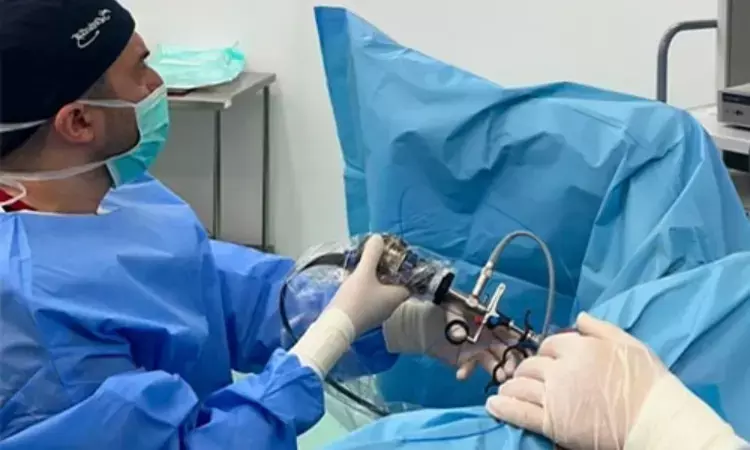- Home
- Medical news & Guidelines
- Anesthesiology
- Cardiology and CTVS
- Critical Care
- Dentistry
- Dermatology
- Diabetes and Endocrinology
- ENT
- Gastroenterology
- Medicine
- Nephrology
- Neurology
- Obstretics-Gynaecology
- Oncology
- Ophthalmology
- Orthopaedics
- Pediatrics-Neonatology
- Psychiatry
- Pulmonology
- Radiology
- Surgery
- Urology
- Laboratory Medicine
- Diet
- Nursing
- Paramedical
- Physiotherapy
- Health news
- Fact Check
- Bone Health Fact Check
- Brain Health Fact Check
- Cancer Related Fact Check
- Child Care Fact Check
- Dental and oral health fact check
- Diabetes and metabolic health fact check
- Diet and Nutrition Fact Check
- Eye and ENT Care Fact Check
- Fitness fact check
- Gut health fact check
- Heart health fact check
- Kidney health fact check
- Medical education fact check
- Men's health fact check
- Respiratory fact check
- Skin and hair care fact check
- Vaccine and Immunization fact check
- Women's health fact check
- AYUSH
- State News
- Andaman and Nicobar Islands
- Andhra Pradesh
- Arunachal Pradesh
- Assam
- Bihar
- Chandigarh
- Chattisgarh
- Dadra and Nagar Haveli
- Daman and Diu
- Delhi
- Goa
- Gujarat
- Haryana
- Himachal Pradesh
- Jammu & Kashmir
- Jharkhand
- Karnataka
- Kerala
- Ladakh
- Lakshadweep
- Madhya Pradesh
- Maharashtra
- Manipur
- Meghalaya
- Mizoram
- Nagaland
- Odisha
- Puducherry
- Punjab
- Rajasthan
- Sikkim
- Tamil Nadu
- Telangana
- Tripura
- Uttar Pradesh
- Uttrakhand
- West Bengal
- Medical Education
- Industry
Very Early endoscopy may arrest acute upper GI bleeding, cut mortality: BMC

A new study published in the journal of BMC Gastroenterology showed that the 30-day mortality rate for older individuals with acute non-variceal upper gastrointestinal hemorrhage was considerably decreased by very early endoscopy (<12 hours). There is still considerable debate over the best time to do an endoscopy for acute upper gastrointestinal bleeding (UGIB). Differences in the current guidelines for the time between presentation and endoscopy reflect this.
For the majority of UGIB patients, endoscopy within 24 hours is typically considered suitable. But organizing this is still difficult, especially in smaller centers on the weekends. Studies conducted in recent years have detailed the precise early identification of individuals with a very low chance of a bad outcome following UGIB, allowing for early outpatient endoscopic arrangements and the avoidance of inpatient. Thus, Yavuz Cagir and colleagues carried out this study to assess the ideal endoscopic duration in elderly patients with nonvariceal upper gastrointestinal bleeding (NVUGIB).
Based on endoscopic timing, the patients over 65 who present with NVUGIB fall into one of three groups as very early endoscopy (< 12 h), early endoscopy (12-24 h), or late endoscopy (> 24 h). For patients with unstable hemodynamic settings, continuous bleeding, or a low hematocrit despite transfusion, endoscopic intervention was performed during the first 12 hours. The clinical outcomes under investigation were; 30-day mortality was the primary objective, whereas duration of hospital stay, rebleeding, and the necessity for endoscopic intervention were regarded as secondary goals.
Of the 468 people in the research, 260 were over 65. 180 (69.2%) patients over 65 and 150 (72.1%) younger patients had extremely early endoscopies (within 12 hours) based on the endoscopic schedule (p > 0.05). The patients over 65 and younger patients had early endoscopies (12–24 hours) in 53 (20.4%) and 41 (19.7%) cases, respectively, whereas 27 (10.4%) and 17 (8.2%) patients had late endoscopies (24–48 hours). The clinical outcomes of comparisons between groups and subgroups depending on endoscopy time in the population aged 65 and above.
When groups were compared, it was discovered that the very early endoscopy group had a significantly lower risk of requiring surgical/radiological intervention than the late endoscopy group, and 30-day mortality rates by endoscopy timing were statistically quite distinct in the early endoscopy group (7.5%), very early group (15.6%), and late endoscopy group (29.6%).
Endoscopy within 24 to 48 hours (late) was a separate predictor of rebleeding throughout the hospital stay. Overall, early endoscopy may help control acute UGIB, particularly in the elderly with significant comorbidities and severe bleeding.
Source:
Cagir, Y., Durak, M. B., & Yuksel, I. (2024). Optimal endoscopy timing in elderly patients presenting with acute non-variceal upper gastrointestinal bleeding. In BMC Gastroenterology (Vol. 24, Issue 1). Springer Science and Business Media LLC. https://doi.org/10.1186/s12876-024-03541-z
Neuroscience Masters graduate
Jacinthlyn Sylvia, a Neuroscience Master's graduate from Chennai has worked extensively in deciphering the neurobiology of cognition and motor control in aging. She also has spread-out exposure to Neurosurgery from her Bachelor’s. She is currently involved in active Neuro-Oncology research. She is an upcoming neuroscientist with a fiery passion for writing. Her news cover at Medical Dialogues feature recent discoveries and updates from the healthcare and biomedical research fields. She can be reached at editorial@medicaldialogues.in
Dr Kamal Kant Kohli-MBBS, DTCD- a chest specialist with more than 30 years of practice and a flair for writing clinical articles, Dr Kamal Kant Kohli joined Medical Dialogues as a Chief Editor of Medical News. Besides writing articles, as an editor, he proofreads and verifies all the medical content published on Medical Dialogues including those coming from journals, studies,medical conferences,guidelines etc. Email: drkohli@medicaldialogues.in. Contact no. 011-43720751


